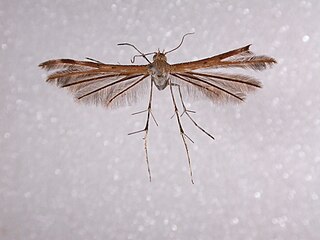| Neurostrota magnifica | |
|---|---|
| Scientific classification | |
| Kingdom: | |
| Phylum: | |
| Class: | |
| Order: | |
| Infraorder: | |
| Family: | |
| Subfamily: | |
| Genus: | |
| Species: | N. magnifica |
| Binomial name | |
| Neurostrota magnifica Landry, 2006 | |
Neurostrota magnifica is a moth of the family Gracillariidae. It is known from the Galápagos Islands. [1]

Moths comprise a group of insects related to butterflies, belonging to the order Lepidoptera. Most lepidopterans are moths, and there are thought to be approximately 160,000 species of moth, many of which have yet to be described. Most species of moth are nocturnal, but there are also crepuscular and diurnal species.

Gracillariidae is an important family of insects in the order Lepidoptera and the principal family of leaf miners that includes several economic, horticultural or recently invasive pest species such as the horse-chestnut leaf miner, Cameraria ohridella.

The Galápagos Islands, part of the Republic of Ecuador, are an archipelago of volcanic islands distributed on either side of the equator in the Pacific Ocean surrounding the centre of the Western Hemisphere, 906 km (563 mi) west of continental Ecuador. The islands are known for their large number of endemic species and were studied by Charles Darwin during the second voyage of HMS Beagle. His observations and collections contributed to the inception of Darwin's theory of evolution by means of natural selection.

